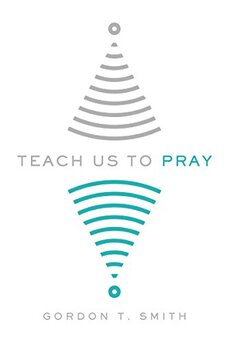|
I used to be more comfortable praying in front of others, but I fear I’m out of practice. I often feel like I don’t have the words to dress the large emotions within me. And when others pray? I often find my mind drifting. I have never been an auditory learner. I take notes compulsively during a talk or a meeting, using my pen and paper to keep me grounded and focused. When I pray privately, I do so more often within a journal -- listing prayers of praise and thanksgiving first, ending with petitions for the day ahead. Within the churches I have attended throughout my life, prayer has been a staple segment of the Sunday services, punctuating breaks in between scripture reading, praise songs and sermons. I have never been a part of a church tradition that spends hours in prayer on a regular basis. But prayer has been there, regularly. Why? Why do we pray? This month I had a few opportunities to consider the role of prayer in my day-to-day life. First, a friend gave me Gordon T. Smith’s small book Teach Us To Pray. Then, our congregation began a sermon series about what we can learn about the very first church, including how they devoted themselves to prayer. Finally, my husband and I joined others from our umbrella network of churches in order to engage in an annual morning of prayer -- prayers of praise, thanksgiving, discernment and petition, with requests both close to home and our churches as well as the needs of those in our cities, country and world. Why do we pray? I remember the first time I asked this question as a child. My mom told me that we pray because Jesus tells us to. And indeed, you can’t get more clear than his direct instruction. “This is how you should pray,” as he recited what we have come to name the Lord’s prayer: “Father, hallowed be your name, your kingdom come. Give us each day our daily bread. Forgive us our sins, for we also forgive everyone who sins against us. And lead us not into temptation.” (Luke 2:2-4) I have been thinking about the Lord’s prayer this month, particularly when it comes to prayers of petition. My family has been in a season of uncertainty, and I have been praying for our “daily bread” in so many ways. As I reflect on the past several months, I am amazed by how we have been provided for. We have had enough, every day. So every time I begin to worry about what tomorrow will bring, I ask God to remind me of his faithfulness. Why do I pray? I now think of another reason: Prayer fosters gratitude. The Bible tells us in Acts 2:42 that the first church “devoted themselves to pray”. When Peter was imprisoned, the church gathered and prayed for him. Why did the church pray? I’m not sure we know the beliefs of the first church well enough from the description. Because my first assumption is that they prayed because they believed God would do what they asked. After all, they had witnessed the resurrection! They had witnessed the Holy Spirit come down like tongues of fire on Pentecost! But when Peter miraculously walked out of prison and knocked at the door, they concluded that it must be his spirit, not him in the flesh. Maybe they prayed out of custom or because Jesus told them to. But when they gathered to pray, God answered. At the start of our church prayer gathering recently, our pastor suggested that when people gather to pray, God does great things. We don’t know the why of it. We just see it born out. We took some time to celebrate how, over this past year, God has answered the prayers of our congregations that we prayed at our last annual prayer gathering. I have to admit though, that while I believed in and supported the purpose of our gathering, when my family needed to leave the prayer gathering early, I was a little relieved that I hadn’t needed to stumble through praying out loud. In his short book Teach Us To Pray, Gordon Smith suggests that the length of the prayer doesn’t matter, and that even the words don’t matter much. He reminds us that God knows more about the issues we’re praying about than we do anyway. Then why do it?
Smith encourages the reader to establish a regular prayer pattern, echoing the advice of my pastor who preached on this recently. My pastor suggested one pattern that has worked for him over the years. Following the pattern of the week, he prays this way:
On Saturday night, he prays for the church, because Sunday is coming. On Sunday night, he prays for the working world, because Monday is coming. On Tuesday, he prays for the nation, because elections are held on Tuesdays. On Wednesday, he prays for himself, because it’s midweek and he probably needs a spiritual boost. On Friday night, he prays for his family and friends, because the weekend is coming and he’s about to spend time with them. And how should we pray? Smith offers this approach:
Smith urges us to follow each step, and to remember that as we pray for God to act, “these prayers are never an “out” or a justification for our inaction. They are rather the deep longings and hopes of the world, the church, and our own hearts and minds--our pleas that God would act, that God would be present, that the grace of God would invade our world.” (108) This is why we pray.
0 Comments
Leave a Reply. |
Author's Log
Here you will find a catalog of my writing and reflections. Archives
December 2022
|
